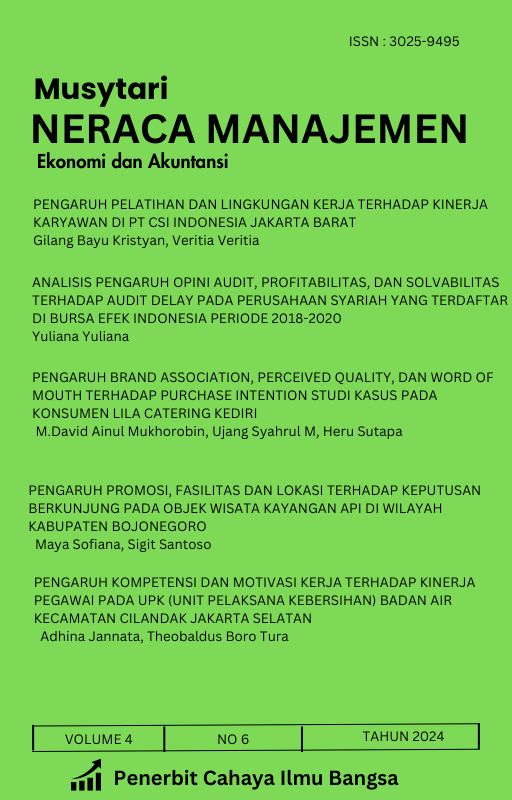Pemahaman dan Persepsi Masyarakat terhadap Penerapan PPh Final Pasal 4 Ayat 2: Studi Kualitatif tentang Kepatuhan dan Kendala dalam Pelaksanaan Pemotongan Pajak Penghasilan di Kota Medan
Published 2025-06-04
Keywords
- indonesia
How to Cite
Abstract
This study examines the understanding and perceptions of the Medan City community regarding the implementation of Final Income Tax Article 4 Paragraph 2, focusing on compliance factors and operational constraints. Using a qualitative approach, data were collected through in-depth interviews with 15 SMEs, accountants, and taxpayers, supplemented by focus group discussions (FGDs) and document analysis. The findings reveal significant disparities in understanding, with 75% of micro-SMEs demonstrating limited knowledge of tax rate calculations and taxable objects. Perceptions of unfairness stemmed from flat-rate policies perceived to disregard business profit margins, while administrative challenges—such as reporting complexity and inadequate socialization—hindered compliance. However, reputational incentives and digital service accessibility emerged as potential drivers of voluntary participation. The study underscores the urgency of regulatory simplification, sector-specific educational programs, and technology integration to strengthen tax policy legitimacy. These insights contribute a micro-social perspective critical for designing inclusive fiscal strategies in Indonesia’s urban contexts.
Keywords: Tax compliance, Final Income Tax Article 4(2), public perception, fiscal justice, administrative barriers
References
- Alm, J., & Torgler, B. (2011). Do Ethics Matter? Tax Compliance and
- Morality.https://doi.org/10.1007/S10551-011-0761-9
- Darmayasa, I. N., Aneswari, Y. R., & Yusdita, E. E. (2017). MENINGKATKAN KEPATUHAN DAN
- PENERIMAAN PAJAK MELALUI WITHHOLDING TAX SYSTEM.
- https://doi.org/10.21107/infestasi.v12i2.2769
- Effendy, F. R., & Mariana, L. (2021). ANALISIS PERHITUNGAN DAN PEMOTONGAN PAJAK
- PENGHASILAN FINAL PASAL 4 AYAT (2) ATAS JASA SEWA TANAH DAN/BANGUNAN
- PADA PT. ANGKASA PURA I (Persero) MAKASSAR. https://doi.org/10.26618/jrp.v4i2.6325
- Harefa, M. S., & Laia, A. Y. (2023). ANALISIS PENERAPAN PAJAK PENGHASILAN FINAL PASAL
- 4 AYAT 2 ATAS JASA KONTRUKSI (Studi Kasus Pada CV. Tuberta).
- https://doi.org/10.36655/jeb.v4i2.768
- Mayasari, R., & Narsa, I. M. (2020). Kajian Kritis Terhadap Strategi Reformasi Perpajakan Dalam
- Menyambut Era Digital. https://doi.org/10.24843/eja.2020.v30.i02.p11
- Milios, L. (2021). Towards a Circular Economy Taxation Framework: Expectations and Challenges of
- Implementation. https://doi.org/10.1007/s43615-020-00002-z
- Pangaribuan, F. L., Ritonga, A., & Budi, H. S. (2024). ACHIEVING THE LEGAL OBJECTIVE OF
- WITHHOLDING INCOME TAX ON FOREIGN YOUTUBE VIDEO CREATORS FOR
- VIDEO UTILIZATION INCOME SOURCED IN INDONESIA.
- https://doi.org/10.19166/glr.v4i2.8327
- Puspitaningsih, A., & Megasari, I. (2024). CALCULATIONS AND REPORTING FINAL PPh 4
- Paragraph (2) PT SELENA CAHAYA GEMILANG SURABAYA.
- https://doi.org/10.62045/acfis.v3i2.256
- Rawlings, G. (2003). Contesting Fairness and Fragmenting Groups: Cultural Narratives of Taxation and
- Citizenship in Globalising Australia. https://doi.org/10.1002/j.1839-4655.2003.tb01147.x
- Senawi, A., & Osmadi, A. (2023). Property tax reassessment among local authorities: the implementation
- and its key challenges. https://doi.org/10.1108/jfmpc-04-2022-0022
- Sheffrin, S., & Zhao, R. (2020). Public perceptions of the tax avoidance of corporations and the wealthy.
- https://doi.org/10.1007/s00181-020-01870-y

